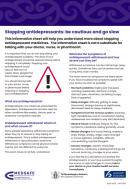Like all medicines, venlafaxine can cause side effects, although not everyone gets them. Often side effects improve as your body gets used to the new medicine.
Suicidal behaviour
The use of antidepressants has been linked with an increase in suicidal thoughts and behaviour. Children, teenagers, young adults and people with a history of suicidal behaviour are particularly at risk.
This is most likely during the first few weeks of starting an antidepressant or if the dose is changed. It's important to look for signs of suicidal behaviour such as agitation or aggression and ask about suicidal thoughts, self-harm, worsening of low mood, If you notice any of these signs, contact your doctor immediately. It's ok and important to ask about suicidal thoughts and this won't increase the risk.
If you need urgent help or are concerned, phone:
- Lifeline 0800 543 354 (available 24 hours a day)
- Healthline 0800 611 116, who can give you the phone number for your local mental health crisis line.
Sexual side effects
Venlafaxine can cause reduced sexual drive, lack of libido and problems keeping an erection. It’s important to talk to your healthcare provider if you get these effects, as they can be difficult to deal with and may not go away. Your healthcare provider may be able to suggest treatment or may reduce the dose of venlafaxine or change you to a different antidepressant. Read more about medicines and sexual problems.
Other side effects
| Side effects |
What should I do? |
- Nausea (feeling sick) or vomiting (being sick)
- Stomach upset
|
- Try taking venlafaxine after food.
- Tell your doctor if these bother you and the symptoms are ongoing.
|
- Feeling sleepy, drowsy, dizzy or tired
|
- Try taking venlafaxine in the evening.
- Be careful when driving or using tools until you know how this medicine affects you.
- Tell your doctor if this bothers you.
|
- Headache
- Dry mouth
- Increased sweating
- Trouble sleeping
|
- These are quite common when you first start taking venlafaxine and usually go away with time.
- Tell your doctor if these bother you.
|
|
|
|
- Suicidal thoughts, thoughts of harming yourself, or worsening depression
|
- Tell your doctor immediately or ring Healthline on 0800 611 116.
|
- Changes in heart beat such as fast heart rate or irregular heart beat
- Seizures
|
- Tell your doctor immediately or ring Healthline on 0800 611 116.
|
- Signs of serotonin syndrome such as feeling agitated and restless, heavy sweating, shivering, fast heart rate or irregular heart beat, headache, diarrhoea and rigid or twitching muscles
- You are at increased risk of serotonin syndrome if you recently started taking venlafaxine or recently increased the dose
|
- Tell your doctor immediately or ring Healthline on 0800 611 116.
|
Read more about medicines and side effects and reporting a reaction you think might be a side effect.









